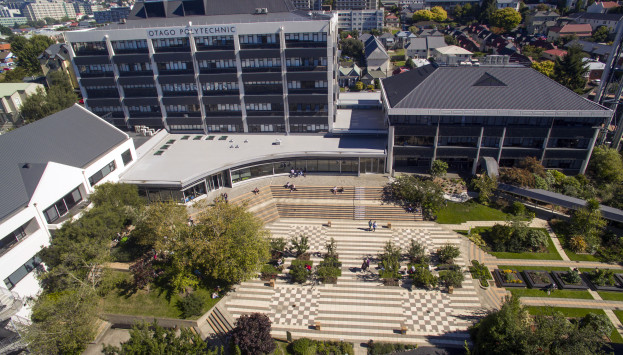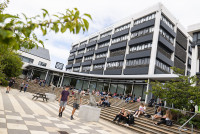Otago Polytechnic has contributed almost a billion dollars to the Dunedin economy over the past five years.
Otago Polytechnic’s latest Economic Impact Report shows the institution’s Dunedin Campus added a total value of more than $967 million to the Dunedin economy from 2017 to 2021.
The report shows Otago Polytechnic’s Dunedin Campus accounted for $212 million total expenditure to Dunedin’s gross domestic product of $6.82 billion in 2021, compared to a contribution of $194 million the previous year.
“These 2021 results show that Otago Polytechnic is continuing to make significant contributions to Dunedin’s economy,” says Dr Megan Gibbons, Chief Executive, Otago Polytechnic.
“This report reflects our record of innovation and adaptation.
“Our ability to collaborate with industry and community is also a big factor in our institutional health.”
The report also assesses the flow-on (or indirect) total expenditure of all Otago Polytechnic’s activities – including its Cromwell Campus and Auckland International Campus – to be $469 million in 2021. In Dunedin total expenditure was $385 million, up $20 million on 2020.
Over half (68.5% or $321 million) of that flow-on expenditure across all campuses was driven by student spending. The remainder was derived from day-to-day Otago Polytechnic expenditure and the impact of staff spending their wages and salaries within their local economies.
Otago Polytechnic is one of Dunedin’s larger employers. In 2021, it employed 562 full-time equivalent (FTES) staff at its Dunedin campus. In total, Otago Polytechnic employed 637 full-time equivalent staff (FTES) in 2021, across all its campuses in Dunedin, Cromwell and Auckland (AIC).
From 2019 to 2021 Dunedin campus EFTS increased by 6.9% overall (domestic and international), from 4336 EFTS (2019) to 4634 EFTS (2021). Over all campuses, Otago Polytechnic’s enrolments in 2021 totalled 5664 EFTS or more than 10,213 actual students (head count).
Otago Polytechnic’s contribution goes beyond economic
“Although the report largely looks at economic results, the value of education should be regarded outside merely fiscal bounds,” Dr Gibbons says.
“Education changes people’s lives and the trajectory for them, their whanau, and communities. There is growth in learning new things and reaching new goals, contributing to society and in helping others to achieve.
“These benefits are more difficult to measure but contribute both directly and indirectly to economic, social, cultural, spiritual and environmental wellbeing.
“As we continue our transition with Te Pūkenga, of which have been a subsidiary since April 2020, we continue to be involved in a highly collaborative process, working together to make improvements for the betterment of all learners,” Dr Gibbons says.
“The charter for Te Pukenga is clear that while there are benefits in a networked approach, we also need to be responsive in the regions – and this is something Otago Polytechnic has proven time and again.
“It’s imperative to keep in mind that our learners are – and always will be – at the centre of what we do. We continue to focus on our mahi supporting current and future learners with their educational aspirations.”
Published on 30 Aug 2022
Orderdate: 30 Aug 2022
Expiry: 30 Aug 2024








